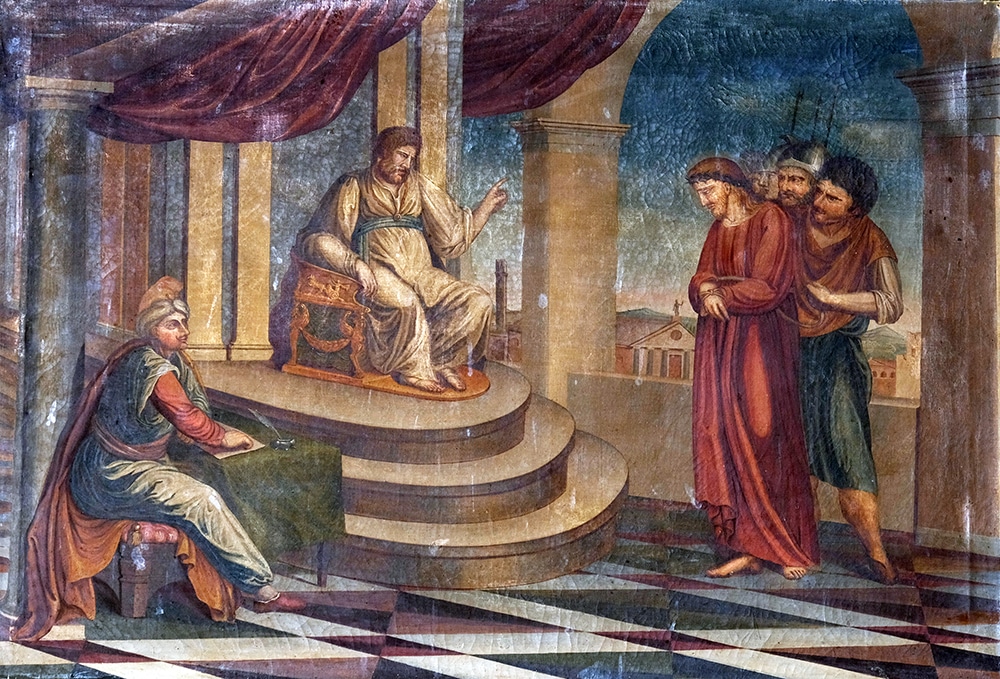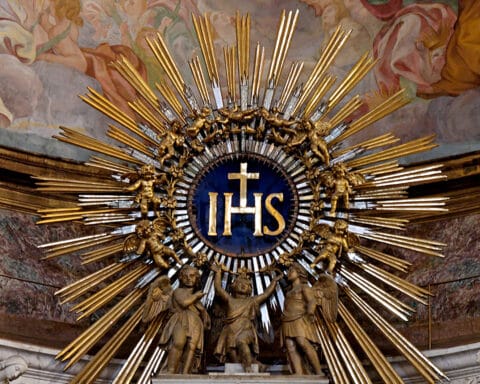
— Richard Bucci, via email
Answer: The daily language of Jesus would surely have been Aramaic. The ancient Hebrew of the early years of the Bible had given way to Aramaic in much the same way as Latin gave way to Italian, Spanish, French and Romanian, among other languages. Aramaic was spoken by Jews throughout the Holy Land, and it would have been a kind of mother tongue for Jesus and his disciples.
Jesus would also have command of ancient Hebrew, which remained the language of the Scriptures and also predominated in the liturgy of the Temple and synagogues. Most young men were taught early on how to read and have a basic understanding of biblical and liturgical Hebrew in much the same way the altar boys of old (and still now in the extraordinary form of the Mass) learn basic Latin.
Given the presence of the Greeks and, later, the Romans, ancient Greek was also widely understood by most Jews of the time of Christ. This was due to their interactions with the gentiles who spoke Greek as a common language uniting the Roman Empire. It was certainly needed in many marketplaces and in other necessary interactions with people in non-Jewish areas of the Holy Land, such as the Decapolis region (the region of Ten Hellenistic cities just to the east of Israel). While not necessarily fluent, most Jews could get by in speaking and understanding Greek.
As for Latin, while it was the mother tongue of the Romans in and around Italy, the Roman Empire grew to encompass large areas to the East and South of Rome that had made up the Greek Empire and where Greek was widely spoken. Hence most Romans and other gentiles in the regions of the Holy Land spoke Greek more than Latin.
So Jesus’ discussion with Pilate was not necessarily conducted in Latin. Pilate surely knew Greek and likely a lot of Aramaic, or he may have had a translator. As God, Jesus certainly knew Latin, but as man it may have been less known to him except by infused knowledge. Neither he nor Pilate would require recourse to Latin for the reasons stated. However, it is interesting to note in the movie “The Passion of the Christ,” Mel Gibson artistically puts the conversation between them in Latin. Pilate begins in Aramaic and Jesus answers in Latin. This greatly surprises Pilate, who continues the conversation in Latin. It seems Gibson wants to emphasize that Jesus is seeking to reach Pilate by using his mother tongue. This, of course, is a cinematic flourish, which may not reflect the language of the actual conversation.
Conscience
Question: Can you tell us a little about conscience from a Catholic point of view? Sometimes it seems very subjective.
— Raymond Adamczyk, via email
Answer: Conscience is an act of judgment of our practical reason whereby we assess the moral quality of a particular act from general principles. Because laws and principles are most often of a general nature, they must be applied to each act by the practical reason; this is what conscience does (cf. Catechism No. 1778).
Conscience is more than a sense of general moral principles. There is, to be sure, a basic moral sense that human beings have about right and wrong. St. Thomas calls this sort of moral understanding “synderesis.” It is the natural perception of general and self-evident principles, fundamental truths of morality and the natural law. But synderesis is not conscience itself. Conscience makes use of such knowledge, draws conclusions and applies it by way of judgment to a particular situation.
Conscience can err and is not its own law. Conscience is true or false insofar as it agrees with or falls short of divine law, natural law and human law that is just and in conformity with divine law. A false conscience judges what is unlawful to be lawful or what is lawful to be unlawful.
Conscience is not independent of divine law nor of just law and legitimate authority. It is not private inspiration or interpretation. It is not a law unto itself. Conscience does not establish law. The role of conscience is to apply what is taught by God, (through natural law, divine revelation and the Church) to particular situations. The aim of conscience cannot be to resist such law but rather to receive and apply it.
Msgr. Charles Pope is the pastor of Holy Comforter-St. Cyprian in Washington, D.C., and writes for the Archdiocese of Washington, D.C. at blog.adw.org. Send questions to msgrpope@osv.com.





